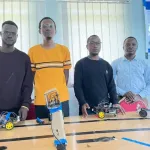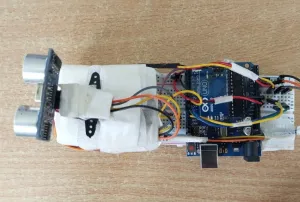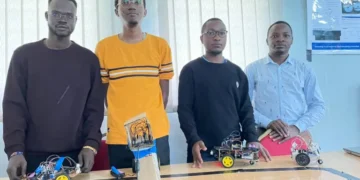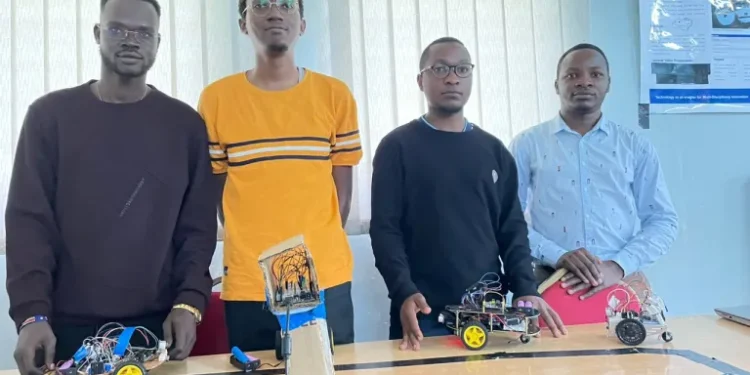Uganda Christian University (UCU) student, Anei Agany Mabui, has invented a robot to curb road crashes.
Mabui, a South Sudanese student pursuing a Bachelor of Science in Computer Science, says he decided to do something to think of a solution to reduce the risks of road accidents.
“One time I took a patient to Mulago hospital, and I couldn’t get a bed for him because most of the beds were occupied by patients from motorcycle accidents,” he told Irene Best Nyapendi, the university blogger writer.
With the help of two coursemates, Mabui developed the model robot to alleviate collisions at traffic junctions.
Mabui, Marvin Kauta and Gary Mathew Nkuraija developed the prototype with equipment that UCU Partners donated to the university’s robotics laboratory.
“Our aim is to reduce motorcycle accidents at traffic light junctions in Uganda,” Mabui said.
He observed that at the traffic lights junction, accidents are a result of the mad dash after the lights have turned green for the motorists to go.
“There are three colours on the traffic lights, whereby red signifies stop, orange means get ready to move and green signifies move. When the green lights go on, it allows both motorcycles and vehicles to move at the same time, but because of the huge volume, it causes collisions.”

The students reasoned the solution to avoid collisions was adding a fourth traffic light, which is the blue light.
“So, when the blue light goes on, it signifies that only motorcycles can move, to avoid congestion of both cars and motorcycles moving at once,” Mabui said.
The students also derived inspiration for the project from the 11th Sustainable Development Goal (SDG) set by the United Nations to make cities inclusive, safe, resilient and sustainable.
The project gives a basic idea of how to reduce traffic accidents on major roads and road junctions with traffic lights.
The Uganda annual police crime report 2022, registered 20,394 cases of road accidents. Of those, 4,534 died, 15,227 had serious injuries and 1,712 sustained minor other injuries.
Emmanuel Isabirye, the students’ instructor in charge of innovation, said UCU has a dedicated practical training program and research laboratory for robotics, data science, artificial intelligence and mechatronics.
One of the robots was developed by computing students based at UCU.
“I am so proud and happy to see my students innovate and create an impact in the community,” Isabirye said.

He said Mabui, Kauta and Nkurajja hit two birds with one stone: that is the 9th and 11th SDG. The 9th SDG aims at building resilient infrastructure, promoting sustainable industrialization and fostering innovation.
“We appreciate Uganda Partners for their timely intervention through the donation of equipment,” Isabirye said.
“The students have been wanting to experiment with their ideas, but they didn’t have the equipment to make the prototypes”.
Isabirye hopes innovations will become a culture for university students before they graduate.
UCU Partners donated an assortment of items including sensors like infrared sensors, ultrasonic sensors, led bulbs, batteries, Arduino boards, breadboards, jumper wires, glue and servo motors.
The project was entirely a brainchild of the Department of Computing and Technology students.
“We are implementing what we learnt last semester and through that knowledge, we have come up with something impactful,” Kauta said.
Nkuraija said during their study, they looked at the Kampala-Jinja Road as their case study because of the high number of accidents on the carriageway. During heavy traffic, cars and motorcycles follow each other so closely, many times resulting in accidents.
He said with automation, it is possible to ensure a certain level of safety on the road.

“We are basing on improving the traffic light system through using automation to reduce stampedes and accidents on the road,” Nkuraija said.
He called on motorists to embrace the project once it is offered to them, so that the road is safer for them, their passengers and other road users.
The student solution to end fatal crashes on the road is a significant step towards the integration of technology and electronics in pursuit of optimizing limited resources.
In February this year, UCU received a grant of €53,000 from the Innovation Fund for Development (IFD) to support a major green energy project.
The project, which will be led by Professor William Kisaalita, a visiting professor at UCU, aims to tackle climate change by replacing natural charcoal with long-lasting, eco-friendly briquettes made from bamboo.
In the same month, Dr. Rosemary Bulyaba, Head of the Department of Natural Resource Economics and Agribusiness, won a grant, worth USD 69,630, from The World Academy of Sciences.
The grant, focusing on Exploiting the potential of cowpeas for vegetable use in Uganda, will run for two years.
The Mukono-based university also partnered with German-based universities to boost the renewable energy sector.
Credit: Jimmy Siyasa & Irene Best Nyapendi (UCU)









